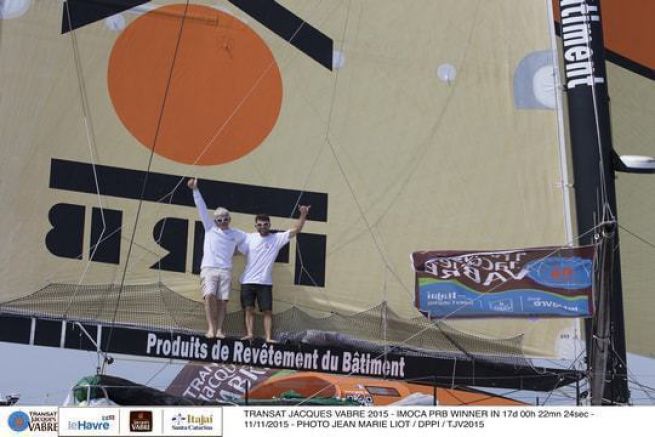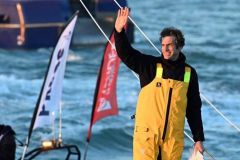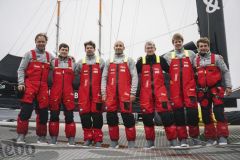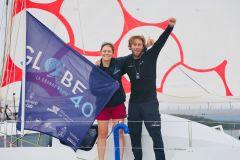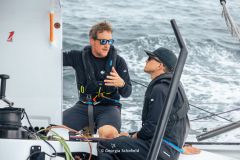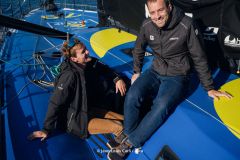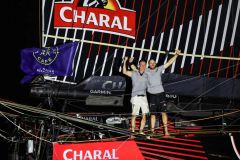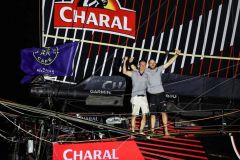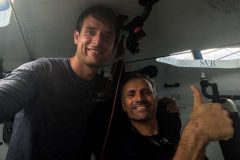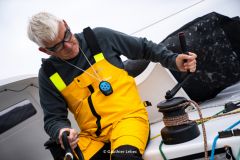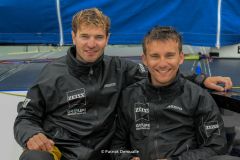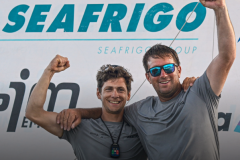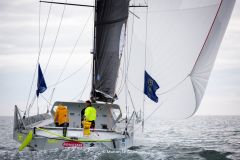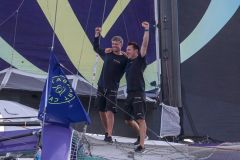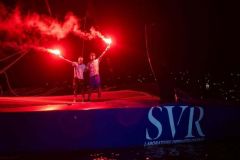And it is a second victory on this course between Le Havre and Itajai since Vincent Riou is none other than the title holder. In 2013, he was accompanied by Jean Le Cam and also took 17 days. This year, he chose the match racing specialist, Sébastien Col, to assist him on this North-South course.
The Imoca monohull had already undergone a major refit for the 2014 Route du Rhum, but the boat had to retire due to structural damage. This time, the 2010 VPLP-Verdier design was one of the big favorites in this twelfth edition of the Transat Jacques Vabre, alongside SMA and Quéguiner-Leucémie Espoir, as no one knew yet how the new foiling prototypes would performâeuros¦
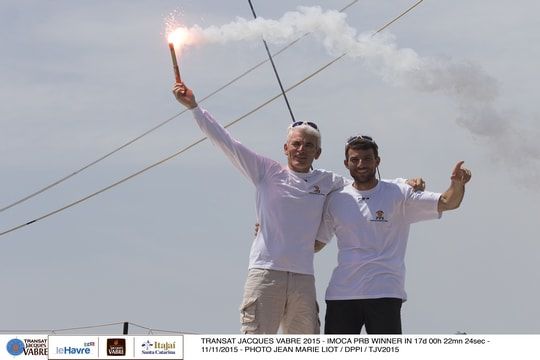
And from the very first miles, the three "classics" were leading the way in the Bay of Seine, but the rest of the Channel showed that the "foilers" were extremely fast in these conditions of light seas and moderate crosswinds. The latter got away even more when they approached the Atlantic, but already the trajectories were different, as PRB and Quéguiner-Leucémie Espoir moved further south when they had to tackle the first Irish low. When Banque Populaire VIII and SMA got stuck in the heart of the low pressure, Eliès-Dalin followed by Riou-Col got out in front to turn due south towards the Azores.
The miles are ticking by for the leading quartet made up of Quéguiner-Leucémie Espoir, PRB, Banque Populaire VIII and SMA, with a margin of more than a hundred miles over the other IMOCA monohulls. A long port tack towards the Atlantic archipelago in still very rough seas did not prevent the sailors from making an average of more than twelve knots: Vincent Riou and Sébastien Col took advantage of this to take the lead. And as they passed the Azores with a more downwind wind and more organized seas, the pace picked up again with averages above eighteen knots!
The foil configuration of Banque Populaire VIII enabled them to overtake this group to the west and follow the curvature of the isobars of the high pressure to find a gybe point at 28° 30 W: Armel Le Cléac'h and Erwan Tabarly led the way and were the first to enter the Doldrums, but with only a thirty mile margin over PRB. The crossing of the Inter-Tropical Convergence Zone (ITCZ) is going to shake up the usual patterns, as the leading trio is sliding towards the South-West to find an exit. But the Doldrums are shifting on the group to the point that the exit becomes complex and tense to avoid the Brazilian tip!
PRB was the first to emerge from the weather slump with a margin of thirty miles over the two competitors as they passed through the interior of the Fernando de Noronha archipelago. Vincent Riou and Sébastien Col then managed to maintain this advantage over Banque Populaire VIII, which was not able to make any headway despite its foil and the moderate easterly trade winds.
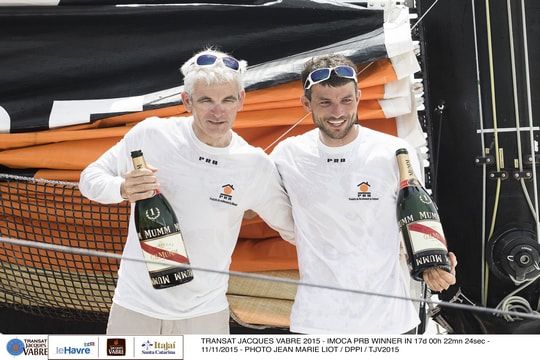
The Gulf of Rio did not change the situation, especially when Armel Le Cléac'h and Erwan Tabarly counter-boarded to control Yann Eliès and Charlie Dalin. PRB could no longer be worried, even if the breeze eased a few dozen miles from the finish line and it was with a lead of more than sixty miles over Banque Populaire VIII and more than 90 miles over Quéguiner-Leucémie Espoir that Vincent Riou and Sébastien Col docked in Itajaí as winners of the IMOCA class.
Vincent Riou, on his arrival in Brazil "We are happy because it was not an easy task to come back whole already. It's hard to remember the state of mind we were in two and a half weeks ago when we left Le Havre. We weren't fooling around. We knew we were setting out on a committed race, with an essential first part in mind, i.e. managing to get through safely and be in the leading pack at the Azores. We managed to do that. And after that, we still had to build everything, that was our basic idea and I think we executed the plan well.
We had a special transatlantic race. We worked on our sensations in this Transat Jacques Vabre. From the very first night of the race, we ran out of navigation equipment. We did everything with only the course and speed displayed. Never, neither the strength, nor the direction, nor the angle of the wind. We even thought of putting the ribbons in the shrouds like we did when we were kids in 420. We did everything without electronic assistance. If someone had told me that before the start, I would have said no way! It can't work. You have to sharpen your senses and get to work. With the few reference points, it's not easy to find the right settings. You always have to be well groomed to get a feel for the boat. The lesson is that it is possible, and to learn it is not so bad".
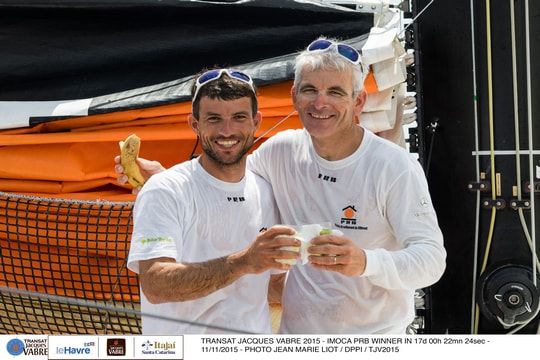
On the game in the lead
"It was a great match, behind, they didn't leave us much of a gap. Before yesterday morning, there was never more than a 35-mile gap between first and second. In a race of 5,400 miles, I think it is committed. There have been a lot of changes in the leaders, everyone has had the lead in the fleet. It was a great race, we found what we were looking for, that is to say the competition. The choice of going to find the depression in the west of Ireland, it was prohibitive not to go there. And for me, it was safer for the boats. The ones that turned left earlier got shaken up a lot more than us. After the long descent of the Atlantic on a reach, we had to keep up the pace, there was not much to do. After 8 days, we found ourselves in a strange doldrums. That's when it started to play out. But it works for me every time, I'll end up not liking this doldrums. We had to have strong nerves, it didn't come down to much for us. It was complex. Going out in front at the Brazilian horn was interesting. We wanted to get out to sea right away. Our friend Bernot, taught us that dragging along the coasts of Brazil, it was still very risky. This allowed us to regain a small advantage. Afterwards, everything went smoothly. We went fast in light airs, we passed the stormy front before the othersâ?¦"
Concerning the Transat Jacques Vabre
"The Transat Jacques Vabre is for me today a great classic of French sailing. It deserves to be considered as such. We clearly came to win the race. It was a tough race. It would have lasted two or three days longer, I think the bodies would have suffered."
What about the new generation of IMOCA boats?
"The new generation is in a learning phase, a discovery phase. We're not playing in the same category. We have an accomplished boat, which we control. They are in discovery mode. It's certain that foils are the future of sailing. We will all have them one day. We can't refuse progress. Today, it's a matter of timing, a delay in the development, we're hot, we have to analyze what happened."
Sébastien Col, on his arrival in Brazil "It was a pleasure, it was impressive to see Vincent work. I was lucky to sail with him, he is a very complete person. He masters a lot of things, as much the technique as the navigation. Physically, it went better. Four years ago with François (Gabart), we were in a tough situation, it's never easy on a new boat to arrive safely.
In the end, this electronic failure is a good lesson, we realize that we are more and more assisted in life in general. The human being is capable of doing great things, of feeling things. It is a beautiful lesson for a performance which is superior somewhere. I also realized how complete you have to be to sail in IMOCA."
On the beautiful images of the race
"The images are the big sea with waves of 6 meters during the first front. Then, each part of the race has its own particularities. We passed between the islands of the Azores, then between the islands of the archipelago of Fernando de Noronha. These are sensations, atmospheres."

 /
/ 